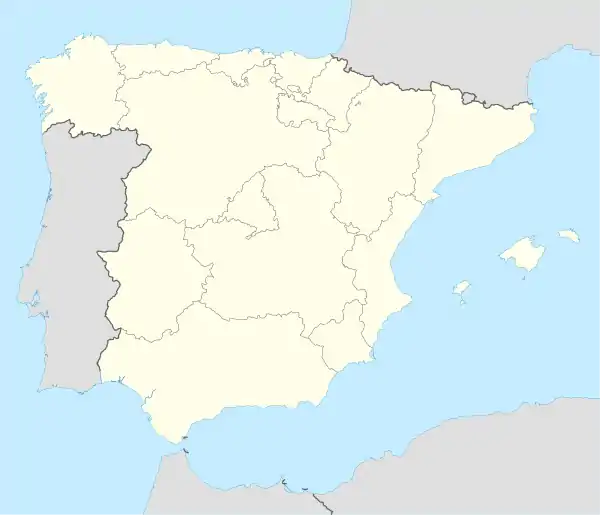Battle of Puente Sanpayo
The Battle of Puente Sanpayo or Battle of San Payo (Galician: Ponte Sampaio) took place at Ponte Sampaio, Pontevedra, between 7–9 June 1809 during the Peninsular War. The Spanish forces commanded by Colonel Pablo Morillo defeated the French forces of Marshall Michel Ney.[1] Ney and his forces were forced to retreat and the French offensive to re-capture the cities of Vigo and Pontevedra was a failure. The battle marked the final evacuation of Galicia by the French army and the creation of a new front.[2][3][4][5][6]
| Battle of Puente Sanpayo | |||||||
|---|---|---|---|---|---|---|---|
| Part of the Peninsular War | |||||||
 Pontevedra Battle of Puente Sanpayo (Spain) | |||||||
| |||||||
| Belligerents | |||||||
|
|
| ||||||
| Commanders and leaders | |||||||
|
|
| ||||||
| Strength | |||||||
| 10,800 | 10,000 | ||||||
| Casualties and losses | |||||||
| 2,000–3,000 dead or wounded | 300 dead or wounded | ||||||
The Battle
Below is a translation from the "Political and Military History of the War of Independence in Spain" by Josep Muñoz Maldonado.
It was fought in the Spanish War of Independence against France during the Peninsular War. The Spanish forces commanded by Colonel Pablo Morillo defeated the French forces of Marshall Michel Ney. Ney and his forces were forced to retreat and the French offensive to re-capture the cities of Vigo and Pontevedra was a failure. The battle marked the final evacuation of Galicia by the French army and the creation of a new front. A body largely of peasants under the command of Captain Morillo, along with the Portuguese troops crossed the Miño and went to Vigo, where Marshal Soult had left a garrison of 2,000 men. He had left them there to occupy this place after marching to Porto in early March. The French began taking refuge in March and garrisoned the castle. More Spaniards, aided by an English frigate that was in the harbour, forced to the French garrison to surrender the castle. The French agreed this defeat provided that they could surrender to the English who were in the harbour. They left the castle in the hands of the Spaniards along with twenty pieces of artillery and Soult’s luggage. The next morning the Spanish passed a French battalion from Tuy, which was ignorant of the events of the previous day, he approached safely to the plaza.
References
- Josep Muñoz Maldonado. "Political and Military History of the War of Independence in Spain"
- Portela Pazos, Salustiano. La Guerra de Independencia en Galicia. Santiago de Compostela. Tipografía del Seminario. 1964.
- Glover, Michael. The Peninsular War 1807-1814. London: Penguin, 2001.
- Smith, Digby. The Napoleonic Wars Data Book. London: Greenhill, 1998.
- Osuna Rey. J. M. Los franceses en Galicia: Historia militar de la Guerra de Independencia en Galicia 1809. A Coruña. Fundación Barrié de la Maza. 2006.
- Estrada Catoyra, Félix. Historia de los ejércitos gallegos durante la Guerra de la Independencia. Santiago de Compostela. Tipografía de El Eco Franciscano. 1916.
Bibliography
- Portela Pazos, Salustiano. La Guerra de Independencia en Galicia. Santiago de Compostela. Tipografía del Seminario. 1964. (in Spanish)
- Glover, Michael. The Peninsular War 1807-1814. London: Penguin, 2001. ISBN 0-14-139041-7
- Smith, Digby. The Napoleonic Wars Data Book. London: Greenhill, 1998. ISBN 1-85367-276-9
- Osuna Rey. J. M. Los franceses en Galicia: Historia militar de la Guerra de Independencia en Galicia 1809. A Coruña. Fundación Barrié de la Maza. 2006. (in Spanish)
- Estrada Catoyra, Félix. Historia de los ejércitos gallegos durante la Guerra de la Independencia. Santiago de Compostela. Tipografía de El Eco Franciscano. 1916. (in Spanish)
- Josep Muñoz Maldonado. "Political and Military History of the War of Independence in Spain"